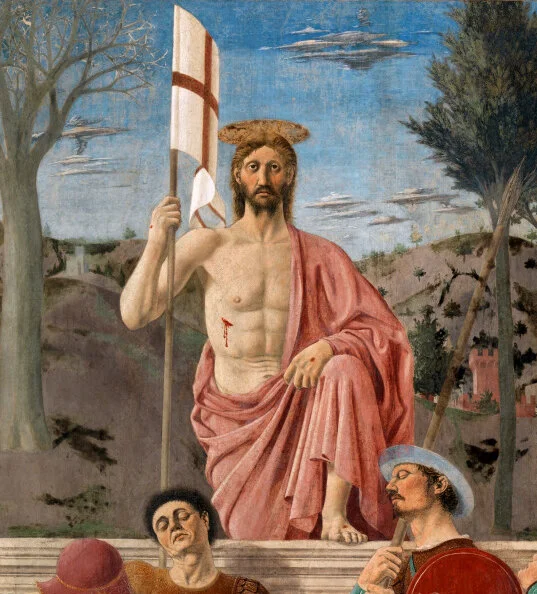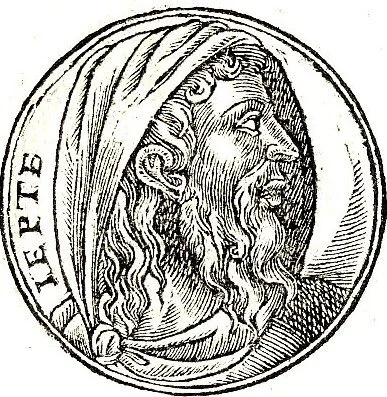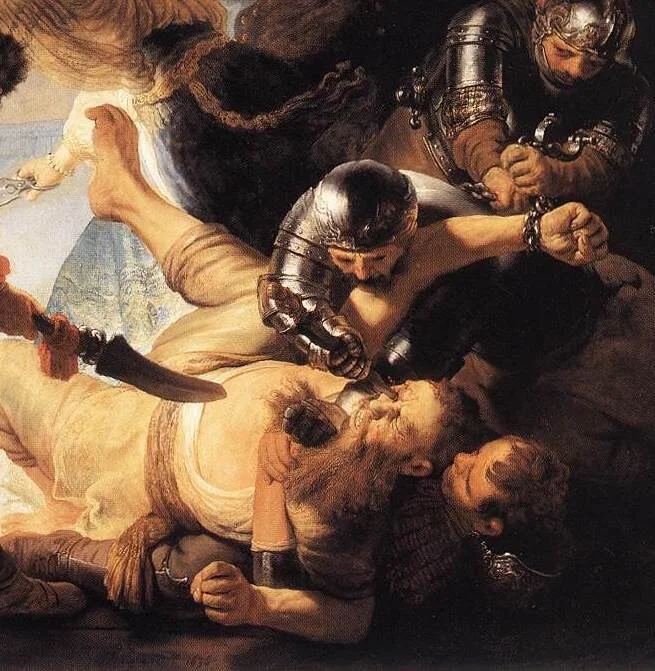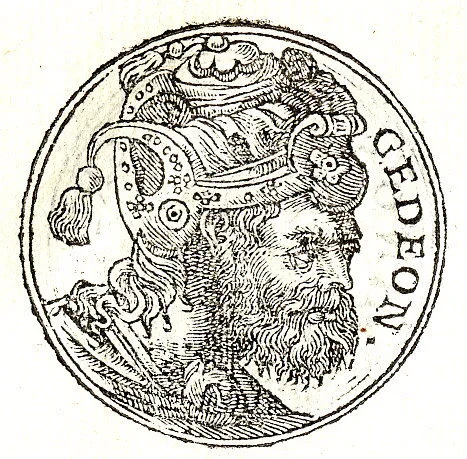In a strange way, the events of the Maundy Thursday and Good Friday are much easier to wrap our minds around than the events of Easter morning. We can picture the disciples on Maundy Thursday breaking bread with Jesus, we can picture Jesus, a towel wrapped around his waist, washing their feet, we can picture Good Friday with the crown of thorns and the crowds, we can picture the cross and the nails, we can picture the spear, and the dead body, and the tomb. [...]
Book review: Holy living (Rowan Williams)
Melanie Marshall reviews Rowan Williams's Holy Living (Bloomsbury 2017).
Easter Series -- "We have seen him"
The gospel stories of the first Easter Sunday morning and the following days have a stark simplicity about them. Although each gospel writer gives an account with a slightly different emphasis and intention, none of them dress the story up with pageantry or high dramatics. There is no attempt to cover up the fear and frailty of the disciples. Nor is there any attempt to explain what happened. Their message is essentially that of Mary, “We have seen the Lord”. [...]
The audio recordings of the Holy Week homilies at St Mary Magdalen's is now available on our Mixcloud page, including sermons for Palm Sunday, Maundy Thursday, the Three Hours' Devotion, the Liturgy of the Lord's Passion, and Easter Sunday. Find them all in a single playlist here.
Easter Series -- "Christ is risen, we are risen"
Today is a day of great celebration. But why? We’re remembering a rather fantastical event that happened, or which is alleged to have happened, almost two thousand years ago. How can that still be good news? How can this man’s coming back to life still be of interest today? Let’s start back at that first Easter, and the experiences of three people. [...]
Easter Series -- "There is nothing to see here"
Crowds are important in Holy Week. On Palm Sunday, as we recall Jesus’s triumphal entry into Jerusalem we carry our palms to remind us of the crowds who welcomed him into the Holy City, with blessings, prayers and shouts of praise. On Maundy Thursday, when we strip the church and leave in silence, we become those crowds of people who have now abandoned Jesus to his fate and leave him entirely alone. [...]
Lent Series: Judges -- Jepthath
This is a hard text. Jephthah was an illegitimate child of Gilead, and ostracised from his family and lived away from the people. But he was a valiant warrior, and Israel was in trouble. So the elders of Gilead went to Jephthah and asked him to lead them. He does so reluctantly, and leads Israel into battle against the Ammonites who were coming against them. Going into battle, he makes a vow to God that if he has victory and returns safely home the first thing that comes out of his house he will consecrate to God and make of it a burnt offering. [...]
Lent Series: Judges -- Delilah
Deborah; Gideon; Samson; and Jephthah next week: the stories of the judges of pre-monarchic Israel are tales of sex and death, violence and debauchery. The judges themselves are morally ambiguous and not irregularly foolish, which is putting things kindly in some cases. Delilah is, of course, not a judge. It is not clear what she is, except to say that without her, Samson would hardly have a story. She is unmistakably the active participant in their relationship, driving the narrative forward with admittedly gender stereotyped activities [...]
Kate Summerscale’s excellent book, The Suspicions of Mr Whicher, is based upon an horrific incident in mid-Victorian England called The Road Hill House Murder. Those studying the mystery are not usually aware of its theological significance. [...]
Lent Series: Judges -- Samson
In comparison with the other Old Testament Judges, it’s easy not to take Samson very seriously. He is no military leader and hardly a willing deliverer of Israel. Instead he is a brawny, brawling, amoral adventurer. A swaggering, audacious Lothario with a penchant for Philistine women. [...]
Lent Series: Judges -- Gideon
Which of you, intending to build an out-house, does not first sit down and estimate the cost, to see whether he has enough to complete it? Well, of course. Prudence is a very British virtue. And which of you, if you were sent down to a riverbank to drink, wouldn’t kneel, and make a cup of your hands, and lift them to your mouth? Well, of course. Decorum is a very British thing, too. [...]
Lent Series: Judges -- Deborah
The Book of Judges describes a period long in Israel’s past, which acts as a bridge between the narratives of Exodus and the conquest and settlement of Canaan on the one hand, and the history of the monarchies of ancient Israel and Judah on the other. There are twelve characters in the book who, we are told, judged Israel, most of whose names we would not now recall, but a few of whom – Deborah, Gideon, Samson, Jephthah – live more easily in our memories because of the stories and songs associated with them. [...]
Christianity: The Basics -- Eucharist
The Eucharist is the Christian story acted out in miniature. The offering of the sinless Son of God for the sinful children of men is not a past event, if by past we mean something over and gone. The incarnate humanity of Christ, offered, sacrificed, risen and ascended, is always part of the Godhead. It is real humanity drawn up into God and eternally representing humanity to God. [...]
Christianity: The Basics -- Baptism
Very often, people talk about how certain things are just “symbolic” or mere “social constructions”. I find this attitude very puzzling, because as far as I can tell, pretty much everything worth caring about is symbolic and socially constructed. Symbolism is about the excess of meaning, about how something means more than it first appears. The 1975 film Jaws is about more than a giant shark terrorising New England beachgoers. [...]
Christianity: The Basics -- Worship
Worship is a word that is difficult for us to define. Often we might think of worship as synonymous with the liturgy, or particular services happening in church. Some use it as a designation for particular parts of a service, the music, for instance: the preacher will give a sermon and then ask the people to stand to 'begin' the time of 'worship', as a group of musicians ascend to the front. [...]
If we knew any Arabic at all, there were two phrases familiar to Malaysian children, regardless of our religious or ethnic background. We woke up every morning to the azan—the call to prayer—which begins with the proclamation that God is great, followed by the affirmation that there is no God but God, and that Muhammad is his prophet. [...]
Christianity: The Basics -- Incarnation, Pt 2: Humanity's Way to God
St Peter's striking words form part of the groundwork for how Christians would understand what our salvation means throughout the centuries. Salvation is not simply forgiveness of sins, or becoming better, more moral, or more generous people. Salvation is a death and a resurrection; “we have died”, Scripture tells us, and now live in Christ (Col 3.3). [...]
Christianity: The Basics -- Incarnation, Pt 1: God speaks
There are many verses of scripture which we could use to introduce the central Christian doctrine of the incarnation, the teaching that, in Jesus of Nazareth, we encounter a person both divine and human. The verse I have chosen begins the Letter to the Hebrews. In many and various ways God spoke to our ancestors through the prophets, but now, in the last days, he has spoken to us in his Son. [...]
Christianity: The Basics -- The Trinity
Each year, the Easter season, stretching from Christ's resurrection to the sending of the Holy Spirit at Pentecost, reminds us afresh that following in the way of Jesus leads us to the deepest, most inconceivable of paradoxes. It reminds us that Jesus reshapes what we mean when we say “God”. [...]
Christianity: The Basics -- God and Creation
There are two ways to approach the Christian doctrine of God: to contemplate the mystery of the Trinity and to ponder the mystery of creation. There is no sense in asking which of these two ways is primary, because Christians are equally committed to both the idea that God is Triune (which is just a fancy of way of saying that God is Three-in-One) and the idea that God is Creator. [...]
















